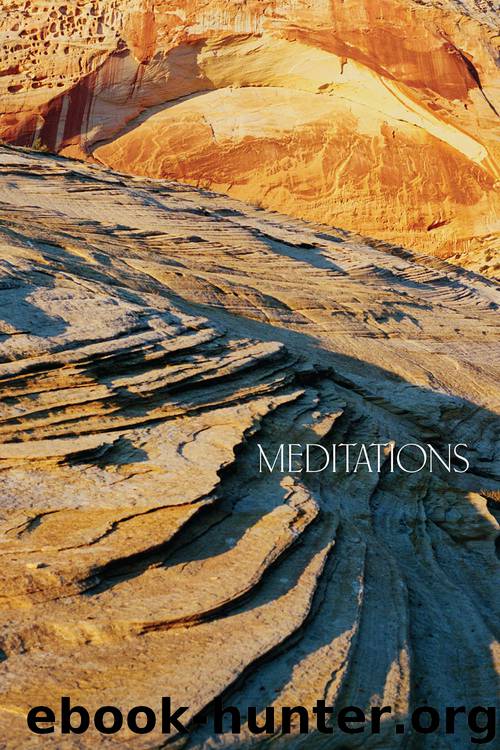Meditations1 by Thanissaro Bhikkhu

Author:Thanissaro Bhikkhu [Bhikkhu, Thanissaro]
Language: eng
Format: epub
Tags: Buddha, Buddhism, Dhamma, Dharma, Jhana, Meditation, Breath Meditation, Thai Forest Tradition, Pali Canon, Theravada
Publisher: Metta Forest Monastery
Published: 2018-02-02T08:00:00+00:00
Vows
October, 2002
When you read Ajaan Lee’s autobiography, you notice the number of times he made vows: vowing to sit all night, vowing to meditate so many hours, vowing to do this, vowing to do without that. The word for vow in Thai is “adhithaan,” which is also translated as determination. You make up your mind, you’re determined to do something. Making determinations like this gives strength to your practice. Otherwise you just sit and meditate for a while and when the going gets tough — “Well, that’s enough for today.” You don’t push your limits. As a result you don’t get a taste of what lies outside the limits of your expectations.
As the Buddha said, the purpose of the practice is to see what you’ve never seen before, realize what you’ve never realized before, and many of these things you’ve never seen or realized lie outside the limits of your imagination. In order to see them, you have to learn how to push yourself more than you might imagine. But this has to be done with skill. That’s why the Buddha said that a good determination involves four qualities: discernment, truth, relinquishment, and peace.
Discernment here means two things. To begin with, it means setting wise goals: learning how to recognize a useful vow, one that aims at something really worthwhile, one in which you’re pushing yourself not too little, not too much — something that’s outside your ordinary expectations but not so far that you come crashing down. Second, it means clearly understanding what you have to do to achieve your goals — what causes will lead to the results you want.
It’s important to have specific goals in your practice: That’s something many people miss. They think that having a goal means you’re constantly depressed about not reaching your goal. Well, that’s not how to relate to goals in a skillful way. You set a goal that’s realistic but challenging, you figure out what causes, what actions, will get you there, and then you focus on those actions.
You can’t practice without a goal, for otherwise everything would fall apart and you yourself would start wondering why you’re here, why you’re meditating, and why you aren’t out sitting on the beach. The trick lies in learning how to relate to your goal in an intelligent way. That’s part of the discernment that forms this factor in determination.
Sometimes we’re taught not to have goals in the meditation. Usually that’s on meditation retreats. You’re in a high-pressure environment, you have a limited amount of time, and so you push, push, push. Without any discernment you can do yourself harm. So in a short-term setting like that it’s wise not to focus on any particular results you want to brag about after the retreat: “I spent two weeks at that monastery, or one week at that meditation center, and I came back with the first jhana.” Like a trophy. You usually end up — if you get something that you can call jhana when you go home — with an unripe mango.
Download
This site does not store any files on its server. We only index and link to content provided by other sites. Please contact the content providers to delete copyright contents if any and email us, we'll remove relevant links or contents immediately.
| Acupuncture & Acupressure | Aromatherapy |
| Ayurveda | Chelation |
| Chinese Medicine | Energy Healing |
| Healing | Herbal Remedies |
| Holistic | Homeopathy |
| Hypnotherapy | Massage |
| Meditation | Naturopathy |
| Reference |
Inner Engineering: A Yogi's Guide to Joy by Sadhguru(5897)
The Power of Now: A Guide to Spiritual Enlightenment by Eckhart Tolle(4756)
Fear by Osho(4085)
The Art of Happiness by The Dalai Lama(3385)
The Ultimate Bodybuilding Cookbook by Kendall Lou Schmidt(3320)
Yoga Therapy by Mark Stephens(3222)
Ikigai by Héctor García & Francesc Miralles(3144)
The Little Book of Hygge by Meik Wiking(3081)
Why Buddhism is True by Robert Wright(2827)
The Healing Self by Deepak Chopra(2796)
Being Aware of Being Aware by Rupert Spira(2706)
Shift into Freedom by Loch Kelly(2692)
Wild Words from Wild Women by Stephens Autumn(2589)
Work Clean by Dan Charnas(2562)
Happiness by Matthieu Ricard(2524)
The Hatha Yoga Pradipika (Translated) by Svatmarama(2482)
Yoga Body & Mind Handbook by Jasmine Tarkeshi(2464)
More Language of Letting Go: 366 New Daily Meditations by Melody Beattie(2444)
Why I Am Not a Feminist by Jessa Crispin(2239)
